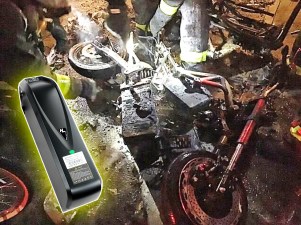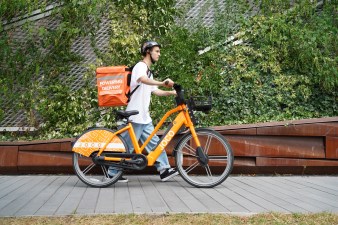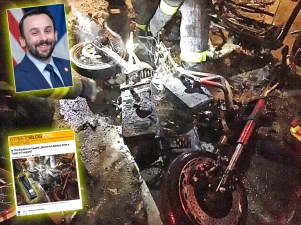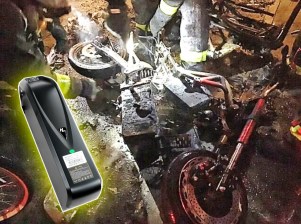Finally! Uber Helps Fund Two Battery Buy-Back Programs
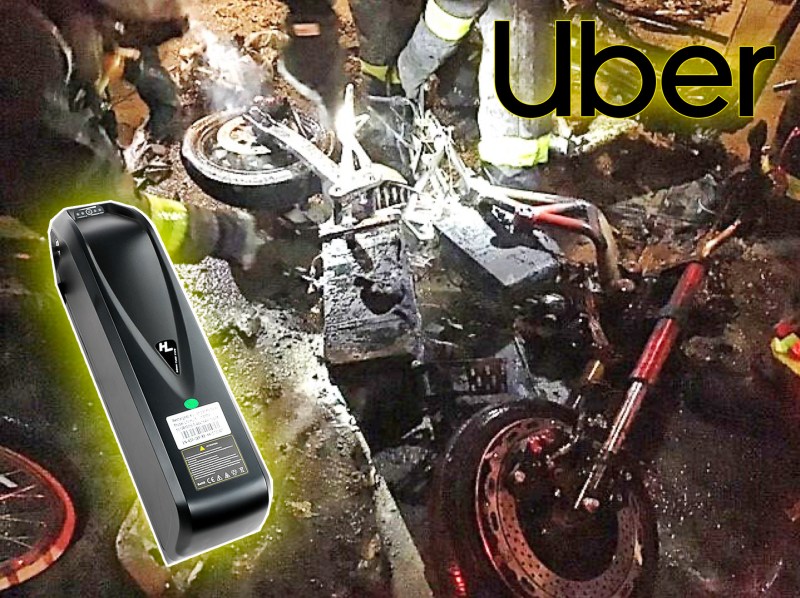
And on the 400th day, the tech god finally did something.
Amid a rise in deadly fires caused by cheap lithium-ion batteries that are integral to the app-based delivery industry, Uber is poised to announce on Tuesday that it will help fund two e-bike trade-in programs and support an added fee on deliveries — the company's first attempt to address the economics that pose the greatest challenge to its gig workforce.
The announcement will come one day after a child and a teenager were killed in a fire on Monday in Queens that the FDNY says was sparked by an exploding lithium-ion battery — and three weeks after the Adams administration released a 35-page plan to combat battery fires that included a hardly veiled reference to how little help has thus far been provided by the private industries that profit from delivery workers using cheap electric bikes.
The Uber announcement — which does not come with a specific dollar commitment — comprises partnerships with The Equitable Commute Project and e-bike company Zoomo that the San Francisco-based tech giant says will create pilot programs aimed at improving access to safe e-bikes and batteries.
The city’s more than 65,000 delivery workers — the majority of whom are low-income immigrant men — take home just $7.09 per hour on average, excluding tips, and many find it difficult to purchase batteries approved by the internationally known Underwriters Laboratory, which can cost up to $1,000.
The partnership with Zoomo will allow for discounted pricing for certified e-bikes and safety accessories. Zoomo is still finalizing its financing options, but expects to offer at least a $200 credit for an old bike.
And the partnership with The Equitable Commute Project will create a more traditional trade-in program with local bike shops, where delivery workers will be able to swap their old, defective, damaged or second-hand batteries for safe, certified ones.
“Delivery workers should not have to choose between making a living and safety. These innovative partnerships will help get safer e-bikes into the hands of delivery workers,” said Josh Gold, senior director for Public Policy at Uber. “By providing discounts and exchange opportunities for new UL certified e-bikes and certified lithium-ion batteries, the expensive price tag that too often acts as a blocker to safety should no longer have to be a concern.”
Uber will also make a $100,000 donation to the FDNY Foundation to be used for an e-bike safety education campaign.
Beyond that, Uber would not reveal how much it’s contributing. The partnerships come after Uber commissioned a study by WXY Studio last fall to look at the heightened demand for micro-mobility devices on city streets. Uber's involvement in helping workers get safer batteries also comes as the city backtracked in supporting a $23.82 minimum wage for delivery workers after lobbying from delivery app companies such as Uber.
The tech giant also signaled its support for tacking on a surcharge to all food deliveries in order to pay for workers being able to transition to safer e-bikes, a twist on an idea floated last month by Streetsblog columnist Charles Komanoff, whose fee would be distance-based to discourage long deliveries.
"People are quick to blame delivery workers for [unsafe streets and fires], but they are rooted in economic exploitation," Komanoff wrote. "This is why I believe a mileage charge on app-based delivery could help."
In the city's 35-page “Charge Safe, Ride Safe" action plan released last month, there was only one reference to private companies being held responsible for their workers' livelihoods or safety, without even mentioning any by name.
"The apps whose businesses rely on the hard work of delivery workers have an important responsibility and role to play in addressing the challenges surrounding e-micromobility," the report said in its only reference to the wealthy tech companies benefitting from the current system of externalized costs.
Mayor Adams, who said he wants to combat lithium-ion battery fires without further demonizing the crucial e-mobility devices or its users, supports the programs and applauded Uber for "stepping up to the plate to help in a major way.”
“E-bikes have become a critical part of our transportation and employment ecosystem, but faulty and non-certified devices are making their way into homes and apartments, causing fires and putting lives at risk,” Adams said in a statement. “This program to increase access to safe and certified e-bikes and batteries for our delivery workers is a welcomed complement to our ‘Charge Safe, Ride Safe’ plan to keep New Yorkers safe from lithium-ion battery fires."
Streetsblog first reported on the idea of a trade-in program last February, and Council Member Keith Powers (D-Manhattan) later introduced legislation for a citywide “buy back” program for defective or uncertified lithium-ion batteries. Powers said a trade-in program is necessary after the council moved to ban the sale of batteries that "fail to meet recognized safety standards."
“There is a public safety issue related to these fires, but when you look at our city — our workers and people who rely on the bikes and do the things we want them to do every day — we have to make sure that alongside shutting down the market for unsafe batteries, we remember that there are people affected by this,” Powers said last month. “The delivery workers are people who want to do their jobs and be in compliance. And let’s not forget, the folks using the bikes, and their families, are also in jeopardy.”
Monday's fire brings the death toll to five so far this year from 59 fires that the FDNY believes were sparked by faulty batteries. Fifty-one people have been injured.
